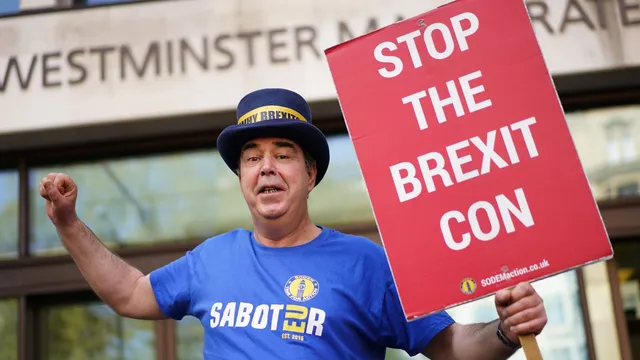
Steve Bray not guilty for playing protest music outside Parliament
2025-04-14 15:57- Steve Bray, also known as 'Stop Brexit Man', played music outside Parliament as a protest against the government on March 20, 2024.
- Police attempted to enforce a ban on his activity but Bray contested their authority, claiming his right to protest.
- He was ultimately acquitted of the charges, reaffirming the tradition of political satire in the UK.
Express your sentiment!
Insights
In the United Kingdom, an activist known as 'Stop Brexit Man', Steve Bray, was cleared of violating a police ban after playing music outside Parliament on March 20, 2024. Prior to then Prime Minister Rishi Sunak's arrival for Prime Minister’s Questions (PMQs), Bray entertained a crowd with edits of popular themes from The Muppet Show and Darth Vader, a nod to Sunak's apparent interest in Star Wars. The police approached Bray just before noon, presenting him with a map detailing prohibited areas where he wasn't allowed to use his speakers as per local by-laws, which he contested by stating that the map was outdated. Following this exchange, he played the music intermittently until the police confiscated his speakers around 12:30 PM. Bray represented himself during the court proceedings, firmly asserting that his actions were part of his fundamental right to protest. He played his music sporadically, countering the prosecution's claims that he was in breach of guidelines under the Police Reform and Social Responsibility Act 2011. In court, Deputy District Judge Anthony Woodcock emphasized that Bray's intentions and methods of expressing his political views were valid and part of a long-standing tradition of political satire in the country. He acknowledged Bray’s self-described anti-Conservative stance and his need for volume to effectively communicate his message from Parliament Street to the Palace of Westminster. The judge ultimately ruled in favor of Bray, declaring that lampooning the government through satire holds a significant place in UK political culture, providing Bray with the legal ground to pursue his artistic protest efforts amid tensions with law enforcement.
Contexts
Protests have been a notable aspect of political discourse in the UK, influencing government policies and societal attitudes in significant ways. This report examines the impact of protests on government policies in the UK, analyzing the historical context, key events, and the mechanisms through which demonstrations affect legislative change. Protests serve as a crucial tool for public expression, harnessing the collective voice of citizens to bring attention to pressing issues ranging from climate change and social justice to labor rights and government accountability. Historically, the UK has witnessed numerous transformative protests that have shaped policy outcomes. Landmark movements, such as the suffragette movement in the early 20th century, successfully campaigned for women’s voting rights and led to legislative reforms. More recent events, including the anti-austerity protests and the climate strikes initiated by Extinction Rebellion, have garnered significant media attention and influenced public opinion, pressing the government to reevaluate its economic and environmental policies. Protests often act as a catalyst for dialogue between the government and the populace, signaling the urgency of particular issues that require addressing. The impact of protests on policymaking can often be traced through changes in public policy or shifts in political focus. For instance, the widespread protests against police brutality and racial injustice, ignited by the international movement following George Floyd’s death, prompted UK officials to commit to reviewing policing practices and racial inequalities. The government’s response to protests can also reveal a balancing act between maintaining public order and acknowledging legitimate grievances raised by demonstrators. In many cases, sustained protests create an environment where governments feel compelled to listen and adapt their policies to align with the demands of their constituents. In conclusion, it is evident that protests have a tangible impact on government policies in the UK. By mobilizing citizens and creating a platform for voices that may otherwise go unheard, protests not only highlight societal issues but also contribute to democratic engagement and governance. National conversations often shift in response to the pressures exerted by these public demonstrations, leading to significant legislative and policy changes. As the landscape of activism continues to evolve, the influence of protests on government policies will remain a critical element in shaping a responsive and accountable political system.